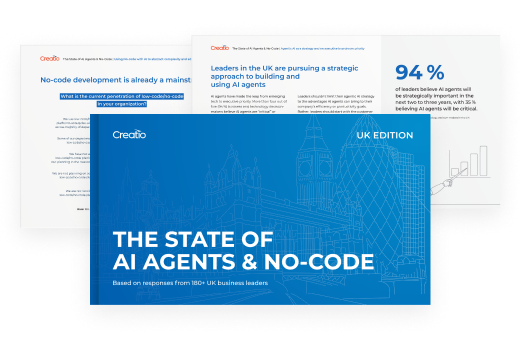-
No-code
Platform
-
Studio
No-code AI-native platform to build applications faster
Discover

-
Studio
-
AI-Native CRM


-
Industries

- Customers
-
Partners

-
About

AI Agents in Customer Service: Enhancing Human Teams to Deliver Exceptional Service at Scale
Updated on
August 29, 2025
15 min read
Deliver 24/7 support with Creatio’s AI agents

The growing demand for instant support and personalised experiences has placed significant pressure on customer service teams. With customer service representatives often handling dozens – if not hundreds – of cases each day, ranging from routine enquiries to more complex issues, meeting costumer expectations has become increasingly challenging. However, the introduction of AI agents into customer service operations represents a real step change. These intelligent systems streamline workflows, allowing agents to improve efficiency and concentrate on more complex, high-value cases.
This article outlines how customer service AI agents enable customer service representatives to deliver personalised support swiftly and at scale.
What are AI Agents in Customer Service?
AI agents in customer service are intelligent systems designed to operate autonomously, supporting teams by improving efficiency and enhancing the overall customer experience. AI agents can engage directly with customers to provide immediate assistance, answering customers' questions, resolving issues, and handling tasks that previously required human intervention.
Unlike traditional chatbots, AI agents make use of advanced technologies such as Machine Learning (ML) and Natural Language Processing (NLP) to deliver more natural and relevant interactions. Rather than relying solely on keyword recognition, these systems are capable of interpreting customer intent – even when queries are phrased in more complex or indirect ways. Moreover, AI agents can learn and adapt from previous engagements, enabling them to deliver increasingly accurate and personalised support over time.
Agentic AI has emerged as a game-changer for customer service, paving the way for autonomous and low-effort customer experiences. Unlike traditional GenAI tools that assist users with information, agentic AI will proactively resolve service requests on behalf of customers, marking a new era in customer engagement.

Agentic AI has emerged as a game-changer for customer service, paving the way for autonomous and low-effort customer experiences. Unlike traditional GenAI tools that assist users with information, agentic AI will proactively resolve service requests on behalf of customers, marking a new era in customer engagement.
How Do AI Agents Empower Customer Service?
AI agents tailored for customer service do far more than simply respond to customer queries. They also work alongside human agents, enhancing the speed and quality of case resolution while improving operational efficiency.
Below are several common use cases illustrating how AI agents support customer service teams:
Responding to Routine Enquiries
AI agents can power intelligent chatbots and virtual assistants that respond to standard customer questions in natural language. Operating around the clock and across multiple languages, these AI agents provide immediate support, even outside business hours. This ensures a consistent experience and allows customer service representatives to focus on more complex and sensitive issues.
Automatically Routing Complex Cases
While AI agents are highly effective at managing routine tasks, complex cases often require emotional intelligence and advanced problem-solving – areas where human agents still excel. In such cases, the AI agent analyses the nature of the request and, recognising its limitations, automatically escalates the issue to a human agent. AI selects the most appropriate team member based on factors such as experience, expertise, and current workload. To ensure a seamless handover, the AI agent generates a concise case summary and instantly shares it with the human agent, so customers are not required to repeat themselves.
Supporting Case Resolution
Customer support representatives can rely on AI agents to enhance the efficiency and accuracy of case resolution. AI agents are capable of instantly retrieving key information from a company's knowledge base and customer records, or analysing previous case outcomes to recommend the most appropriate course of action. By providing timely, data-driven insights, AI agents enable customer professionals to offer more relevant and efficient support. When powered by generative AI, these agents can also assist with drafting personalised responses, helping to resolve cases more swiftly and improve overall customer satisfaction.
Performing tasks on behalf of clients
AI agents extend far beyond the capabilities of traditional chatbots. In addition to responding to customer queries, they can carry out a variety of tasks on the customer’s behalf. For instance, an AI agent may check order statuses, cancel a subscription, complete a returns form, and lodge a complaint – independently and without human supervision. This is made possible by their ability to act autonomously, executing predefined workflows based on customer intent.
According to Gartner, by 2029, AI agents will be able to autonomously resolve 80% of common customer service issues, significantly reducing the need for human intervention in day-to-day enquiries.
Guiding Clients Through Issue Resolution
AI agents can assist customers by providing clear, step-by-step instructions to help resolve common issues. This capability is particularly beneficial in technology-driven sectors, where users frequently encounter similar technical challenges. Once a query is submitted, the AI agent assesses the problem, identifies its context, and retrieves the most relevant solution from the organisation’s knowledge base. The agent is also able to interpret the client's responses, determine whether a suggested solution was effective, and, if necessary, recommend an alternative approach. Should standard troubleshooting steps fail, the AI agent can escalate the case to a customer support representative, along with a summary of the interaction, ensuring a smooth transition and consistent support.
Managing Knowledge Bases
AI agents simplify the management of knowledge bases by automatically maintaining and updating companies' internal resources. They are capable of analysing the factors that contributed to a successful case resolution, summarising the outcome, and storing it within the internal knowledge base. Furthermore, generative AI agents can produce knowledge articles based on resolved cases, ensuring that valuable insights remain accessible to both agents and customers alike.
Analysing Sentiment
AI agents can assist businesses in analysing customer sentiment by collecting feedback from both internal tools and external sources, such as social media and Google reviews. These insights are invaluable, as they offer a clearer understanding of how customers genuinely perceive the brand. With this knowledge, businesses are better equipped to take proactive steps to reinforce a positive brand image.
Analysing Performance
AI agents can evaluate the performance of customer service teams and the overall effectiveness of customer support efforts by continuously monitoring metrics such as average handling time, resolution rates, customer satisfaction scores. Drawing upon this data, they can generate performance reports for stakeholders, highlighting areas of inefficiency, and recommend actions to enhance the quality and efficiency of customer support.
It is important to emphasise that AI agents are not intended to replace human staff, despite what some headlines may imply. Their role is to support service teams by managing routine enquiries and automating repetitive tasks, thereby enabling human agents to concentrate on more complex, high-value interactions.

We see the real opportunity not in agents replacing humans, but in agents complementing teams – human and digital working together in hybrid organisations.
Advantages of Using AI Agents in Customer Service
AI agents provide a wide range of advantages – from enhancing customer experiences and boosting the productivity of human agents to reducing operational expenses. This section highlights the primary benefits of deploying AI agents within customer service operations, along with their impact on service quality and overall business performance.
Outlined below are some of the key benefits associated with the use of AI agents in customer service:
- Increased customer satisfaction: faster response times, round-the-clock availability, and the delivery of accurate information all contribute directly to a more positive customer experience. When customers are able to resolve their issues swiftly and with minimal effort, their overall satisfaction naturally increases.
- Stronger customer loyalty: AI agents are capable of delivering highly personalised experiences by tailoring interactions to each individual client. This extends well beyond simply using a customer’s name; AI agents can analyse customer data, past interactions, preferences, behavioural patterns, and other relevant data to provide precise and meaningful support. Such hyper-personalisation not only enhances the customer experiences but also fosters stronger, long-term loyalty.
- Higher First Contact Resolution (FCR) rates: AI agents play a pivotal role in improving first-contact resolution rates by accurately interpreting customer intent, retrieving relevant information, and performing tasks in real time. This capability enables a greater number of queries to be fully resolved at the initial point of contact, minimising the need for follow-ups or escalation to human agents.
- Improved productivity: AI agents can significantly enhance the productivity of human agents by handling repetitive queries, automating customer service-related tasks, and providing actionable insights. Research by the Nielsen Norman Group indicates that support agents using AI tools were able to manage 13.8% more customer inquiries per hour.
- Efficient scalability: AI agents are well-suited to manage increased volumes of customer enquiries during peak periods, promotional campaigns, or unexpected surges in demand – all without compromising service quality.
- Cost reduction: by deploying AI agents in customer service, companies can avoid the need to recruit additional staff or establish new service centres to support regional expansion. This approach significantly reduces associated operational expenses. In fact, Gartner forecasts that by 2029, delegating common customer service tasks to AI agents will lead to a 30% reduction in operational expenditure.
Supporting Employees with AI-Powered Chatbots
Discover how the Bank of Georgia empowers its internal teams with AI-powered chatbots to boost operational efficiency

Leading AI Agents for Customer Service in 2026
The market for AI agents in customer service is expanding rapidly, with new capabilities emerging almost daily. As the technology continues to advance, businesses are continually uncovering innovative ways to harness AI to enhance customer interactions. However, in such a crowded and fast-moving landscape, identifying the most suitable solution for your organisations can be a challenging task. To aid in the decision-making process, a list of the leading AI agents for customer service in 2025 has been compiled to help you make an informed choice.
1. Creatio
Creatio is a leading provider of AI-native CRM and workflow automation as of 2025, known for integrating predictive, generative, and agentic AI directly into its platform to empower organisations with intelligent, end-to-end automation. Creatio Service, an AI-native service management platform, seamlessly embeds AI into its core at no additional cost, supporting customer service representatives from the outset. With pre-configured, role-based AI agents tailored for customer service, Creatio enables business users to collaborate effectively with AI agents.
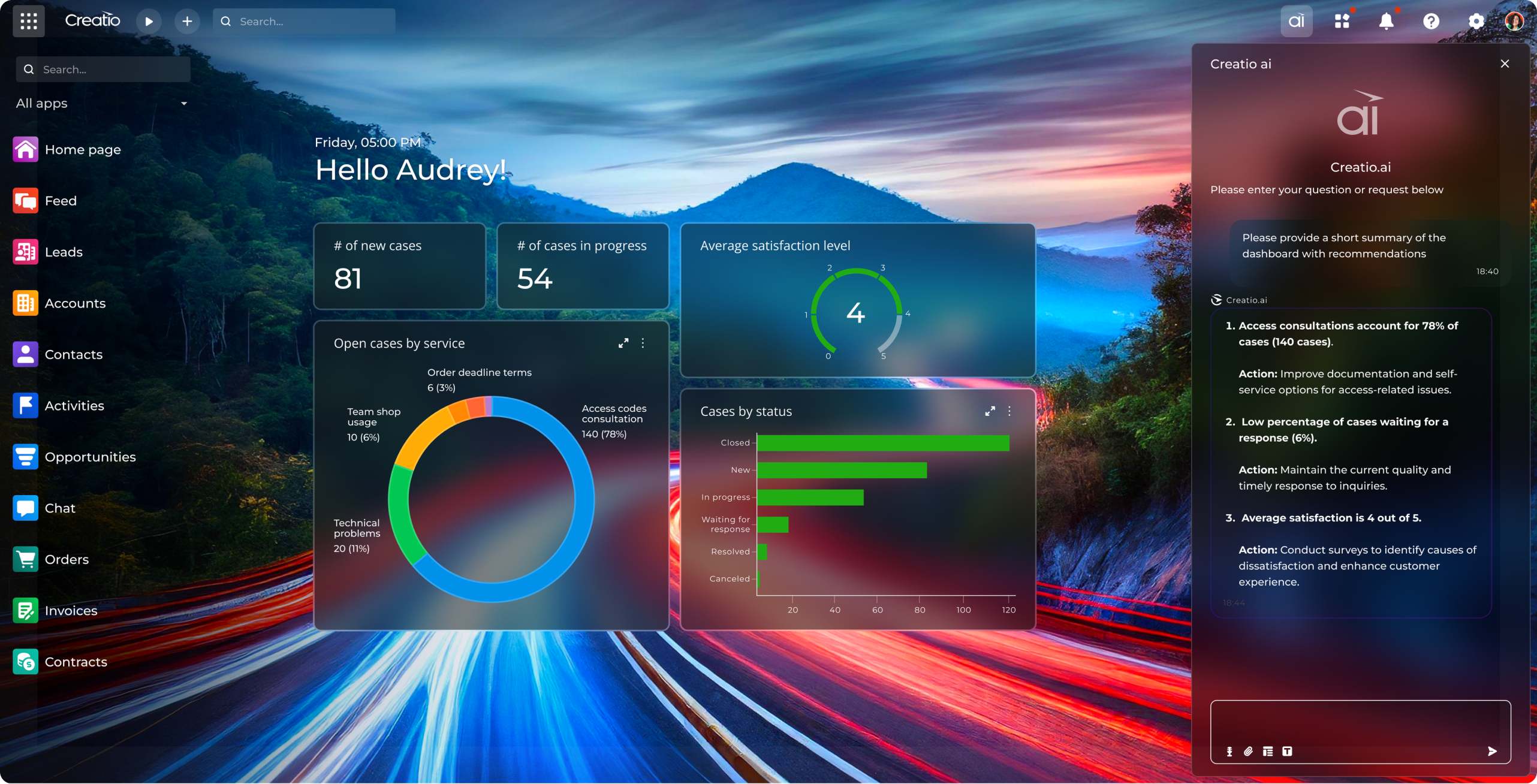
Creatio's AI agents assist businesses in reducing operational inefficiencies while driving significant productivity gains. By autonomously executing tasks, suggesting next best actions in real time, and providing contextual insights, AI agents enhance users’ day-to-day activities and elevate the overall performance of customer service teams. Moreover, with Creatio’s no-code platform and integrated AI capabilities, business users can effortlessly design and deploy highly personalised, role-specific AI agents to meet their unique operational needs.
Creatio empowers organisations to harness the power of AI agents while maintaining full control, transparency, and security. With safe AI architecture, a human-in-the-loop approach, and a robust governance framework, businesses can remain confident in their compliance with data privacy standards and industry regulations. Creatio allows businesses the flexibility to determine the level of autonomy granted to AI agents and equips human agents with the tools to oversee AI responses and actions in real time, ensuring alignment with company policies and strategic objectives.
Core capabilities of Creatio's AI agents for customer service:
- Case routing: AI agents intelligently direct complex cases to the most appropriate human agents, ensuring they are equipped with full context of prior AI interaction.
- Case resolution: AI agents assist service teams in achieving faster and more accurate resolutions by offering actionable insights, recommending the next best actions, and streamlining communication across various channels.
- Sentiment analysis and response generation: An AI agent analyses customer sentiment and generates personalised responses.
- Knowledge base assistance: Knowledge Base Agent aids in the generation and ongoing refinement of support articles, making it easier to maintain accurate and accessible documentation.
- Service management assistance: Customer Support Agent helps manage service cases efficiently, enabling faster issue resolution and enhancing the overall quality of responses.
Pricing:
Creatio's AI agents are fully integrated into the platform and are available to all users across all functions at no additional cost. Pricing for the combined Creatio platform and Creatio Service product begins at ~£30 ($40) per user per month, encompassing all core features and no-code capabilities.
2. Zendesk
Zendesk provides a customer service solution enhanced by AI agents that manage routine inquiries, allowing human agents to concentrate on more complex cases. Designed to deliver instant, round-the-clock responses, Zendesk AI agents also support service teams by unifying customer interactions across all channels, such as web, social media, email, and voice, ensuring agents have the relevant context at their fingertips.
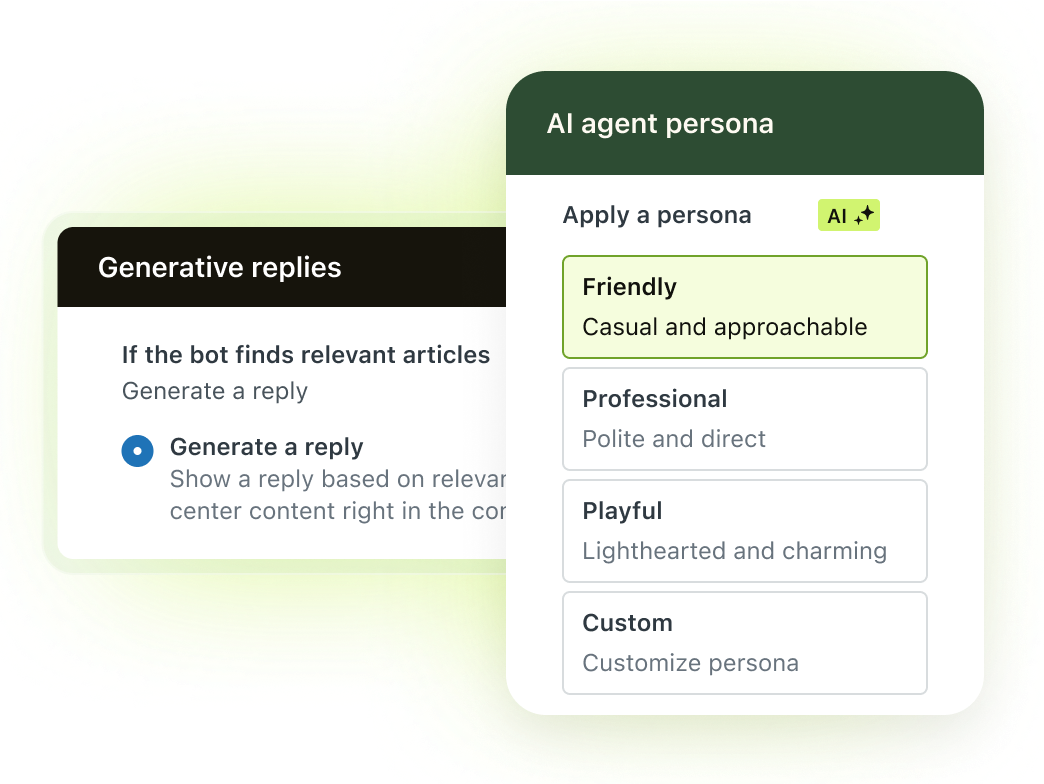
Core Features of Zendesk:
- Knowledge base integration: Zendesk AI agents are linked to the organisation’s knowledge bases, enabling them to deliver on-brand responses to frequently asked questions.
- Custom conversation flows enable the design of tailored conversation paths to guide customers towards effective resolutions, particularly for more complex issues.
- Backend systems integration: AI agents can authenticate customers and deliver contextual responses.
- Agent Copilot: a real-time, AI-powered assistant that supports human agents by suggesting appropriate responses, relevant knowledge base articles, and recommended next steps.
- QA integration: AI agents are connected with quality assurance systems to help identify issues and boost their performance with actionable insights.
Pricing:
Zendesk’s Suite Team plan, which includes AI agent capabilities, is available at ~£41 ($55) per agent per month.
3. Intercom
Intercom provides a comprehensive customer service suite, combining a purpose-built AI agent for customer support, Fin.ai, with a Helpdesk designed to enhance team efficiency and elevate service quality. Fin AI Agent manages customer queries, allowing human agents to concentrate on priority issues. Furthermore, Intercom equips customer service agents with AI-driven tools that assist in investigating and resolving cases with greater ease and effectiveness.
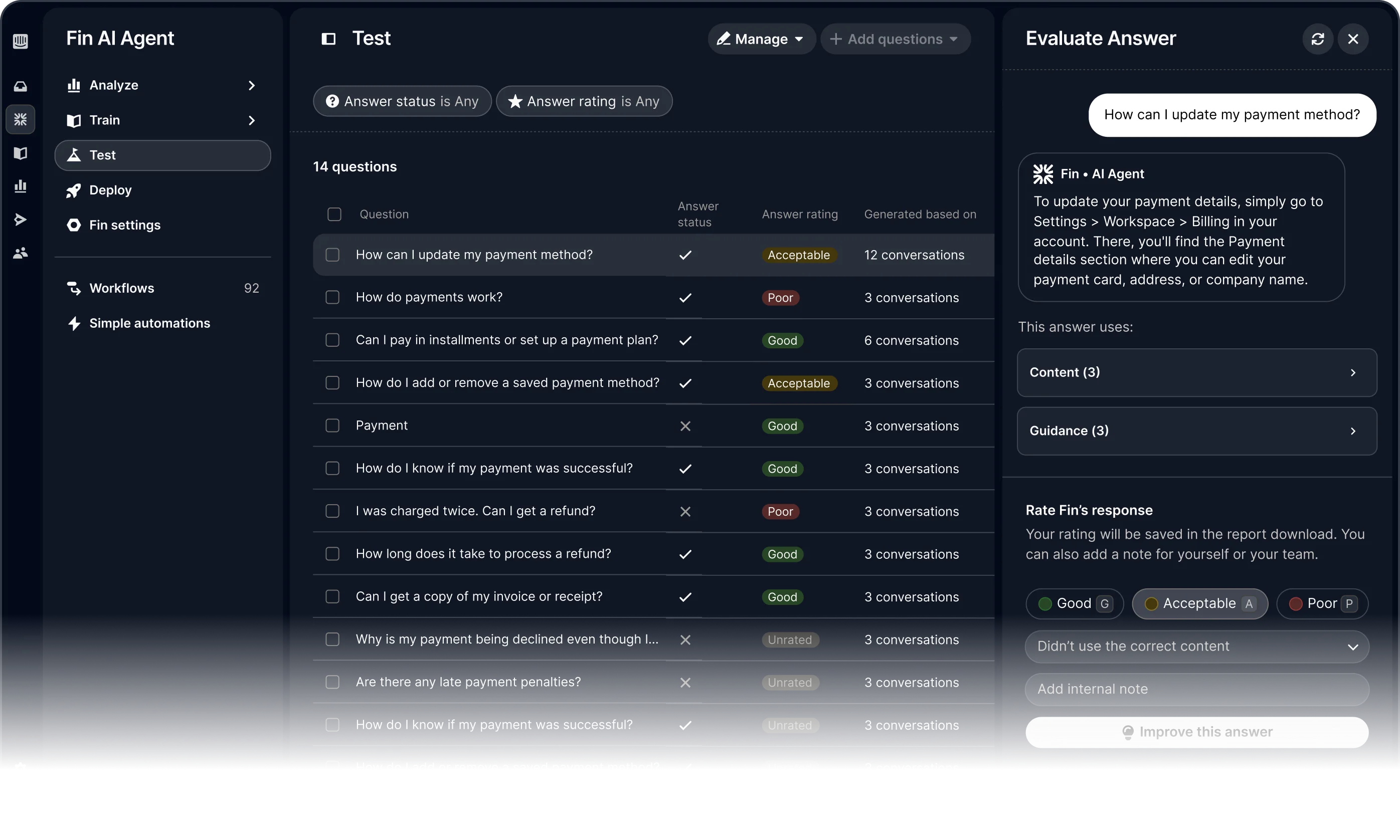
Core Features of Intercom:
- Fin AI Engine enables a Fin AI agent to refine queries, optimise responses, and ensure answer quality through built-in validation.
- Multi-source generative answers: Fin is capable of delivering relevant responses by drawing upon a range of knowledge sources, such as help centre articles, internal support content, PDFs, and excerpts from past conversations.
- Fin Tasks: Fin is designed to manage intricate requests by following instructions to gather details, make informed decisions, and carry out actions accordingly.
- Helpdesk: provides actionable insights and facilitates workflows, ultimately improving the efficiency and output of support agents.
- Copilot for agents: provides AI support within the inbox, helping human agents by summarising conversations, tailoring replies, and automating simple tasks.
Pricing:
Intercom's pricing begins at ~£22 ($29) per user per month for individuals, startups, and small businesses. For organisations already employing a CRM solution or Helpdesk, Fin.ai may be purchased separately at a cost of ~£0.74 ($0.99) per resolution.
4. Salesforce
Salesforce Service Cloud facilitates collaboration between humans and AI agents across a wide range of channels and industries. Salesforce's Agenforce handles low-touch interactions, supporting customer service teams in delivering a smooth and consistent experience from initial contact to final resolution. While human agents concentrate on high-touch interactions, AI agents efficiently handle common customer enquiries, order management, and basic troubleshooting.

Core features of Agentforce for Service:
- Customer Service AI: predictive, generative, and conversational AI solutions are embedded directly into workflows, helping to enhance customer satisfaction while improving service team productivity.
- Service Replies: AI-generated responses are available across channels such as SMS, WhatsApp SMS, and more.
- Service Assistant: streamlines customer support, enhances agent productivity, and ensures compliance with company policy.
- Conversation Summaries: provides AI-generated summaries of customer interactions, tasks, and orders.
- Search Answers: generates trusted, knowledge-based answers directly within the service console or search page.
Pricing:
Agentforce for Service, which includes a CRM platform tailored for customer service operations, begins at ~£411 ($550) per user per month.
See also: Salesforce Alternatives & Competitors
5. Freshworks
Freshworks integrates Freddy AI into its Freshdesk platform to boost customer service efficiency, automate responses, and provide data-driven insights. Freddy AI brings together AI Agent and AI Copilot to resolve queries instantly across multiple channels, while equipping support teams with the necessary context and knowledge to respond effectively.
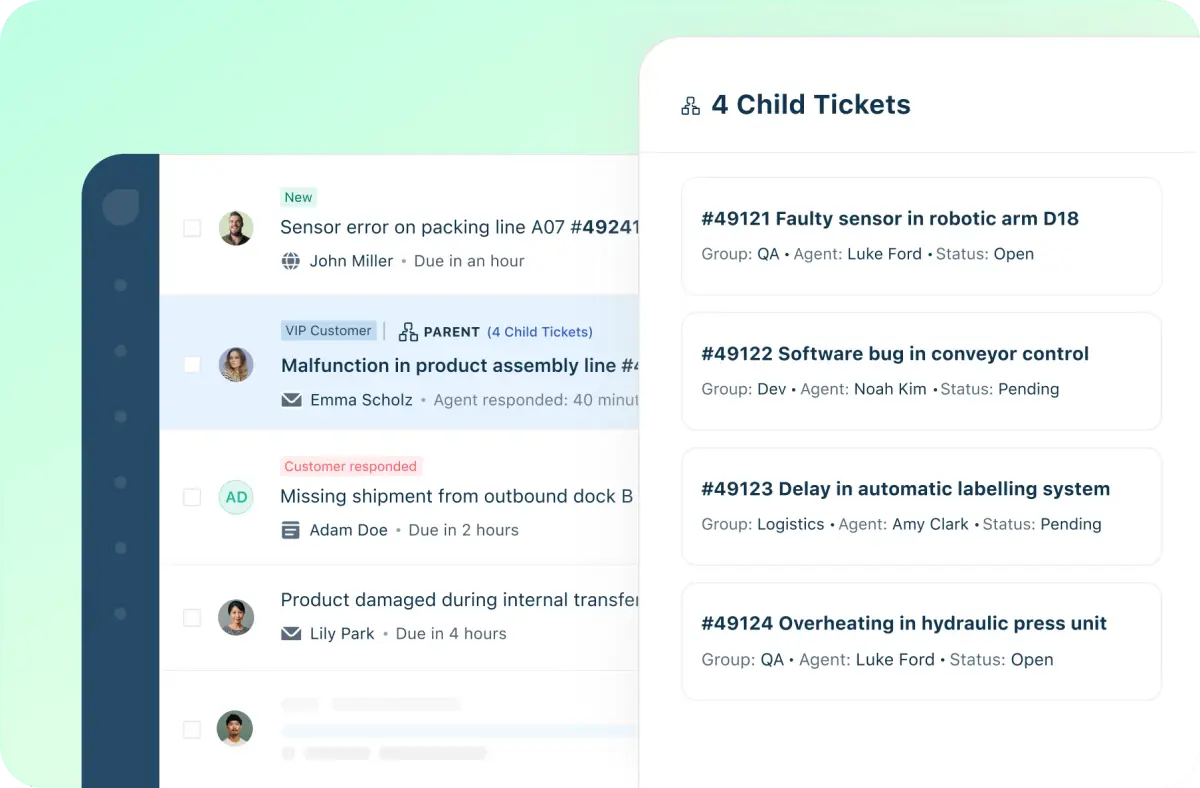
Core Features of Freshdesk:
- AI Agent Studio: empowers users to deploy AI agents equipped with pre-built capabilities for platforms such as Shopify and Stripe.
- Email AI agent: capable of reading incoming email tickets, interpreting requests, and providing accurate responses.
- Conversation AI agents: perform tasks such as updating records, processing refunds, and retrieving relevant information to enhance the efficiency of customer service teams.
- Case escalation: seamlessly hands over conversations to human customer service agents when necessary, with full context retained to ensure a smooth transition.
- Multichannel support: AI agents are designed to manage interactions across a variety of channels, including email, social media, chat, and WhatsApp.
Pricing:
Freshdesk with Freddy AI is available at ~£68 ($78) per agent per month of the Pro + Copilot bundle. Alternatively, Freddy AI may be added to other plans from ~£22 ($29) per agent per month.
6. HubSpot
HubSpot Service Hub includes Breeze, an AI-powered customer service agent designed to enhance support operations. Breeze intelligently locates relevant content, promptly answer pricing questions, and accurately resolve customer issues. Operating around the clock, it handles routine queries, assists with straightforward tasks, and seamlessly escalates more complex matters to human agents when required.
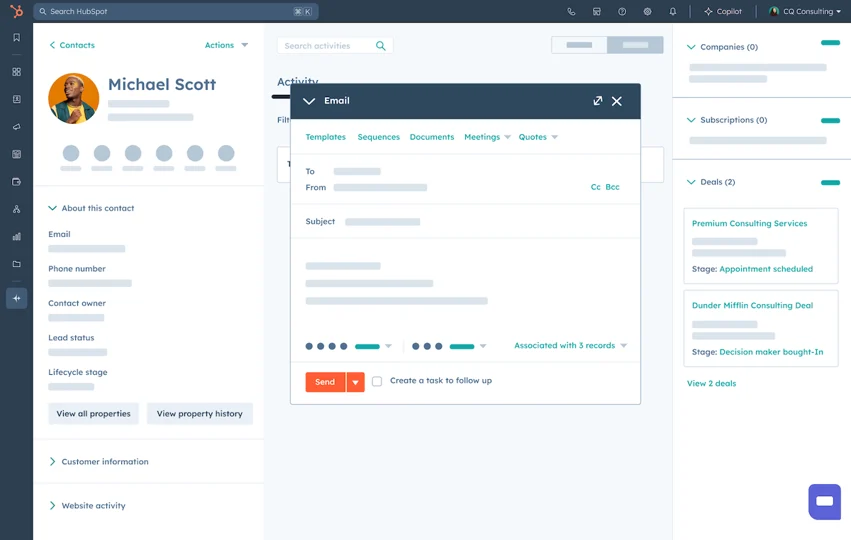
Core Features of Breeze:
- Instant, 24/7 support: customer support AI agent responds instantly to customer queries with accurate answers to boost client satisfaction.
- Trusted answers: Breeze ensures accuracy by relying solely on verified content to respond to queries.
- Automatic handoff: when a situation requires human intervention, Breeze automatically escalates the case to a customer service representative.
- Multichannel support: Breeze operates across various channels, including email, voice, social media, and chat.
- Performance tracking: An AI agent monitors resolution rates, handovers, and customer sentiment, enabling continuous improvement in service quality.
Pricing:
Breeze customer agent is available through a credit-based pricing model, with plans beginning at ~£34 ($45) per month for the Small plan, which includes 5,000 AI credits. However, Breeze is only accessible for businesses already using HubSpot platform, particularly those subscribed to the Service Hub Professional or Enterprise tiers. Service Hub pricing begins at ~£67 ($90) per user per month.
7. Sendbird
Sendbird is an AI agent platform tailored for enterprise use, designed to bring a more human customer experiences through omnichannel AI. Its AI agent enhances customer interactions by delivering personalised engagement and prompt support. By deploying an AI agent for customer service, organisations can automate routine inquiries, reduce support expenses, and increase resolution rates.
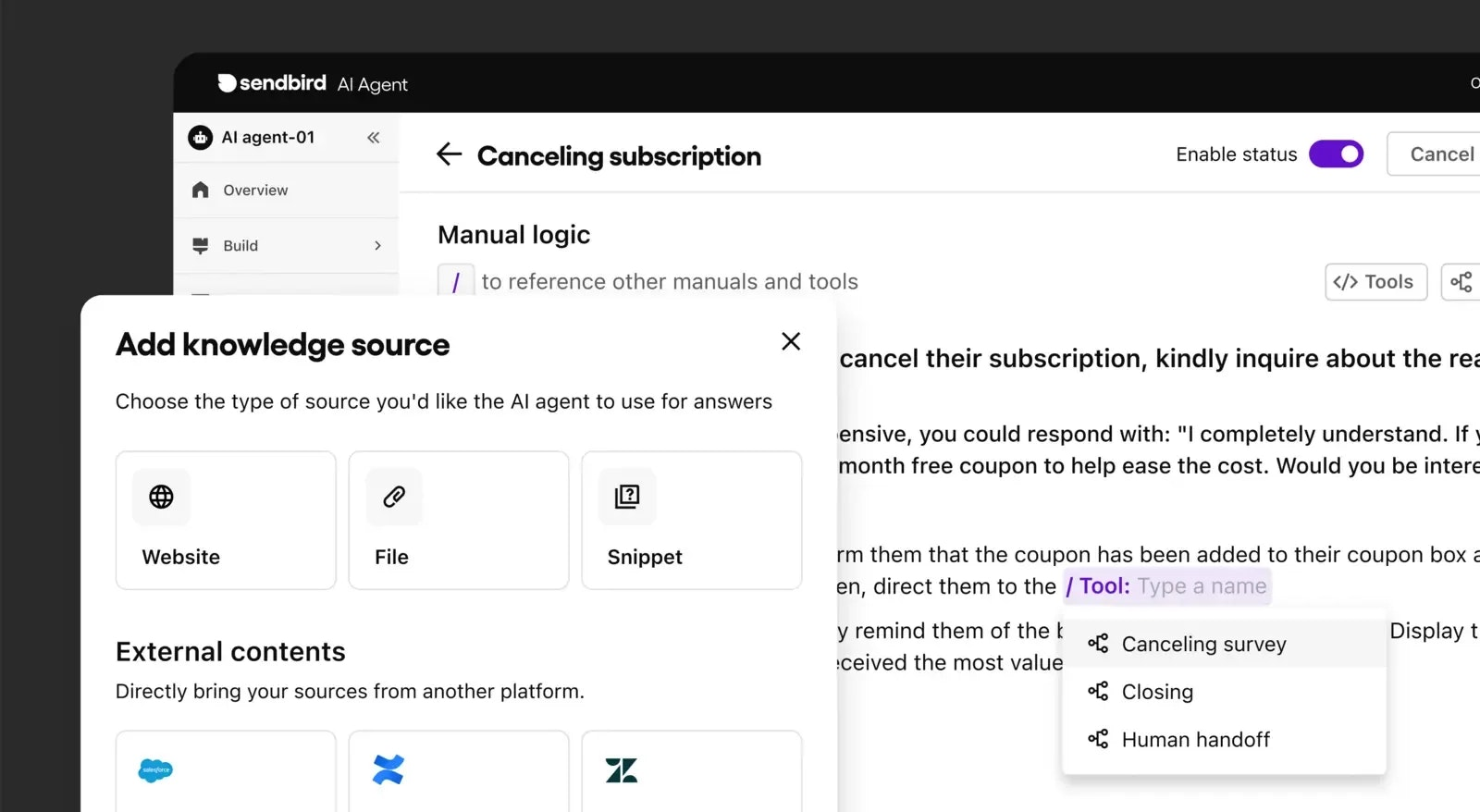
Core features of Sendbird:
- Omnipresent AI: Sendbird's AI agent interacts with customers across multiple channels, retaining the context of each interaction to ensure customers are not required to repeat themselves.
- Proactive AI chat: anticipates customer intent, identifies potential friction points, and addresses issues before they escalate.
- AI agent builder enables the creation of highly personalised AI agents for customer service, designed to reflect the brand's values, voice, and style.
- AI recommendations: provides data-driven suggestions to optimise AI agents for improved performance.
- Integration with customer support software: Sendbird integrates seamlessly with customer support platforms such as Zendesk and Freshchat, and supports integration with third-party knowledge bases.
Pricing:
Sendbird operates on a consumption-based pricing model, tailored to business size and conversation volume. Pricing details are available upon request.
The Future of AI in Customer Service
As artificial intelligence continues to evolve, its role in customer service is set to become increasingly efficient, scalable, and personalised. The emergence of role-based AI agents, multi-agent systems, and sophisticated automation will shape the future of AI technology.
The following section explores how these innovations will define the next generation of AI-powered customer support:
1. Role-based AI agents
AI solution providers are increasingly adopting role-based AI agents, designed to handle specific tasks or functions, in place of more generic systems. Instead of employing a one-size-fits-all AI, businesses are implementing specialised agents dedicated to particular processes such as billing, technical support, or account management. Each AI agent is equipped with in-depth knowledge and expertise in its respective area, enabling the delivery of more accurate and high-quality customer service.
2. Multi-agent systems
The future of AI in customer service lies in the intelligent coordination of multiple, role-based AI agents, rather than reliance on a single, monolithic system. Within such a multi-agent framework, the manager agent is responsible for breaking down complex tasks into more manageable subtasks and assigns them to specialised sub-agents. AI agents are capable of collaborating and sharing information, thereby enhancing their problem-solving capabilities.
For instance, if a customer wishes to remove an item from their order, the system may activate an order management agent to determine whether the change is still possible and to make necessary adjustments. Once complete, a billing agent would update the invoice and initiate a partial refund. Subsequently, another agent would notify the customer of the update, provide a tracking link for the revised order, and give an estimated timeframe for the refund to be processed.
3. End-to-end process automation
By integrating role-based AI agents within a multi-layered system, businesses can achieve greater levels of automation, enabling AI agents to manage not only routine tasks but also complex, end-to-end processes.
Research by Zowie indicates that AI-powered virtual assistants currently automate over 70% of all customer queries, providing relevant responses alongside a personalised experience. Looking ahead, AI agents are expected to oversee the entire customer interaction lifecycle, from initial inquiry to post-service follow-up, with minimal human involvements in numerous instances. Servion Global Solutions forecasts that, by 2028, up to 95% of all customer interactions will be driven by AI.
The State of AI Agents & No-Code: UK Edition
Learn how 180+ UK business leaders use
AI agents and no-code to drive innovation today
AI agents and no-code to drive innovation today
